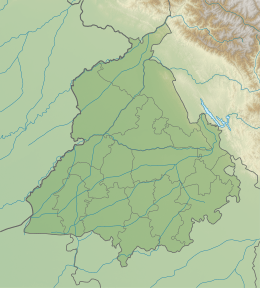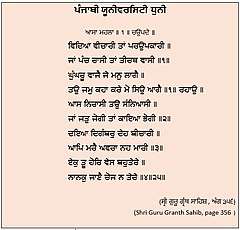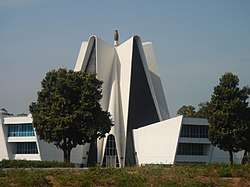Punjabi University
Punjabi University is a state university located in Patiala, Punjab, India. It was established on 30 April 1962, and is only the second university in the world to be named after a language, after Hebrew University of Israel. Originally it was conceived as a unitary multi-faculty teaching and research university, primarily meant for the development and enrichment of Punjabi language and culture, but alive to the social and education requirements of the state.
Motto in English | Education Empowers |
|---|---|
| Type | Public State University |
| Established | 1962 |
Parent institution | Punjab Government |
| Chancellor | V.P. Singh Badnore, Governor of Punjab |
| Vice-Chancellor | Dr. B.S.Ghuman |
| Location | , Punjab , 147002 , 30.36°N 76.45°E |
| Campus | Urban |
| Language | Punjabi, English |
| Nickname | PUP |
| Affiliations | UGC , NAAC , AIU |
| Website | www |
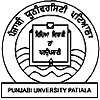 | |
History
Punjabi University was established on 30 April 1962 under the Punjabi University Act 1961 as a residential and teaching university, not as an affiliating University. It started functioning from temporary accommodation in Barandari Palace building. Initially its jurisdictional area was fixed as the 10-mile (16 km) radius. There were only nine colleges – six professional and three art and science colleges in Patiala — which fell within its jurisdiction. The university moved to its present campus in 1965. The campus is spread over about 316 acres (1.28 km2). The campus at Patiala makes international standard facilities available for students and researchers.
Although initially the main task before the university was to develop and promote the language of the Punjabi people, it has since evolved into a multi-faculty educational institution. It grew into an affiliating university in 1969, with 43 colleges affiliated to it and covering Patiala, Sangrur and Bathinda districts of Punjab. Since then, it developed significantly and acquired a distinctive character among the centres of education and research in the country. Now, it has more than 278 affiliated colleges[1] spread over nine districts of Punjab. The affiliated colleges are in districts of Patiala, Barnala, Fatehgarh Sahib, Sangrur, Bathinda, Mansa, Mohali, Rupnagar and Faridkot.
Campus
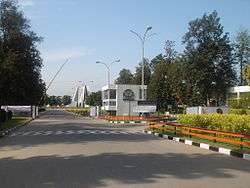
The university campus is spread over an area of over 600 acres (2.4 km2), on the Patiala-Chandigarh road, about 7 kilometers from Patiala. The institution has more than 70 teaching and research departments, covering disciplines in Humanities, Science, Engineering, Pharmacy, Law, Fine Arts, Computer Science and Business Management.[2] University also conducts various degree, diploma and certificate courses through distance learning.[3] University not only caters to students from northern region, but students from African countries also take admission here.[4]
The campus has amenities like a State Bank of India branch, Post office, Science and Arts Auditorium, open-air theatre, guest and faculty houses, seminar complexes, faculty club, botanical garden and several spacious lawns, a model school and own fleet of buses for transportation of students and staff.
The university has undertaken the responsibility of maintaining the estate of Norah Richards at Andretta, Himachal Pradesh. Arrangements have been made for faculty members and students who wish to carry out study and research in the fields of theatre and television. The university manages Balbir Singh Sahitya Kendra at Dehradun, the capital city of the Uttarakhand. There is a rich library with rare books and manuscripts bequeathed by Bhai Vir Singh, Balbir Singh and Prof Puran Singh, the doyens of Punjabi literature. Research on comparative religions is carried out at this center.
Regional centres and Neighborhood campuses
The university has four regional centres: the Guru Kashi Regional Center at Bathinda, Guru Kashi Campus at Talwandi Sabo, Regional Centre for Information Technology and Management at Mohali, Nawab Sher Mohammad Khan Institute of Advanced Studies in Urdu, Persian and Arabic at Malerkotla.[5] Punjabi University also maintains seven neighborhood campuses at Rampura Phul, Jhunir, Sardulgarh, Ralla, Maur, Jaito and Dehla Seehan.[6]
Constituent colleges
The university has also established 13 constituent colleges[7] at Mansa, Rampura Phul, Sardulgarh, Ghudda, Bahadurpur (Mansa), Barnala, Benra (Dhuri),Chuni Kalan, Dhilwan, Ghanaur, Jaito, Meera Pur and Moonak.
Organization and administration
| List of Vice-Chancellors |
|---|
|
The governance of the university is conducted through the Syndicate, which is the highest decision-making body of the university. The Syndicate approves matters pertaining to the administration of the university as well as academics, once the academic council has passed the matter. The vice-chancellor is chairman of syndicate. The Governor of Punjab is chancellor of University and titular head of the university.[8] The Senate and academic Council are other advisory and decision making bodies of the university. All these bodies of university were established under the Punjab Act no. 35 of 1961.[9]
The teacher's elected body is Punjabi University Teacher Association[10] (PUTA) and other staff is represented through employees association.[11] The elections to both these association has been conducted annually.
Academics
Punjabi University is a large, primarily residential and affiliating university. University follows a semester system with Autumn semester usually starting in late July and Spring semester ending in early May. Academics at University is organized into eleven faculties and departments under various faculties.[12]
Teaching and learning
The prominent university departments are:[16]
- University College of Engineering (CSE/ECE/ME/CE)
- Department of Computer Science
- School of Management Studies
- Economics
- Department of Physiotherapy
- Department of Biotechnology
- Department of Pharmaceutical Sciences & Drug Research
- S.Daljit Singh Sethi[17] Physics Department
- Department of Education and Community services
Research centers and institutes
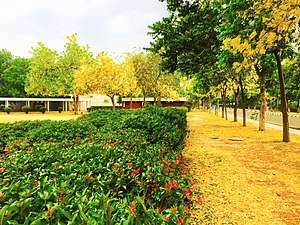
University has established various research departments and chairs to conduct research work in various fields of study.
- Centre for Development Economics and Innovation Studies
- Research Centre for Punjabi Language Technology[18]
- Sri Guru Granth Sahib Studies
- Department of Development of Punjabi Language
- Gurmat Sangeet Chair
Faculty and research
All the departments are involved to promote research culture and spirit. Most of the departments have been able to mobilize additional research funding from UGC, DST, CSIR, Planning Commission, government departments and other official funding agencies. Many of science departments have been able to develop research tie-ups with industry and have undertaken several consultancy assignments.
To ensure academic freedom, the departments organize seminars, symposia, conferences and workshops every year. The teachers are encouraged to participate in national and international seminars through liberal funding. Many teachers are invited to deliver plenary lectures and preside over the sessions at seminars and conferences.
Landmarks
- Guru Gobind Singh Bhawan
- Bhai Kahn Singh Nabha Central Library
- Guru Teg Bahadur Hall
- Charlotte Aujla Auditorium,[23] Kala Bhawan
- Gol Market
- Art Gallery
- Yadavindra College of Engineering
Facilities
University Library
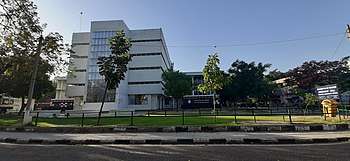
- Bhai Kahn Singh Nabha Central Library is a hub of academic and research activities. It stocks more than 415,000 books and subscribes to several hundred journals. The latest books are added regularly. The library is kept open for 360 days of the year from 8.15 a.m. to 8.15 p.m. The library has a reading hall, which has a capacity for 400 readers. A separate hall for using the personal books and a Reading Room has been provided at the ground floor. One night Reading Room remains open from 8.00 p.m. to 6.00 a.m. To further modernize university library services, it is being computerized.
- Ganda Singh Punjabi Reference Library, which is an integral part of the library, is housed in a new building interlinked with the main building. This part of the library has 41,548 books on Punjabi Language, Literature, Punjab History and Culture.
- The University Library is maintains libraries in some of the departments at the campus, Extension Library at S.A.S.Nagar (Mohali), and a Library at Regional Center Bathinda. Besides, Balbir Singh Sahitya Kendra, Dehradun has a library containing rare books and manuscripts.
Sports
- Students are encouraged to take active part in sports. Facilities for games such as hockey, football, cricket, basketball, volleyball, athletics, etc. and well as indoor games are provided. The Punjabi University has a large gymnasium and a hall for indoor games. It is one of the very few institutions in India to possess its own velodrome.
Hostels
- There are three residential hostels for boys and four residential hostels for girls. The hostels house 4000 students. In addition to this, separate boys and girls hostel for engineering college have started functioning.
Health services
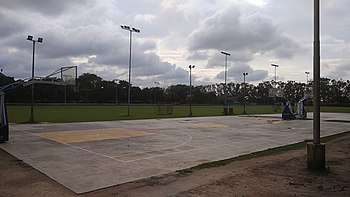
- A health center has an X-ray unit and a laboratory for medical tests. The center has an AIDS awareness wing. Students are entitled to free medical aid by the University Health Center.
Other facilities
- The university has also established a placement cell for personality development and job assistance to students.[24]
- An IAS training centre has been established at university, where coaching for various competitive exams have been imparted.
- The transport department runs a fleet of buses for linking the campus to various parts of Patiala city.
Awards & Achievements
_Trophy_2016-17_to_the_Punjabi_University%2C_Patiala%2C_in_a_glittering_ceremony%2C_at_Rashtrapati_Bhavan%2C_in_New_Delhi_on_August_29%2C_2017.jpg)
- Punjabi University was awarded the Maulana Abul Kalam Azad (MAKA) Trophy for excellence in sports for a record six-times in year 2006–07, 2007–08 and 2013–17.[25]
- The Youth Welfare Department organizes activities all year round. The Punjabi University has won unique distinctions in youth festivals organized by the school's Association of Indian Universities in collaboration with the Ministry of Youth Affairs, government of India, and other events.
- The university has won overall second position in National Inter-University Youth Festival, won overall championship in orth Zone Inter-University Youth Festival many times, has won overall championship in Punjab State Inter-University Youth Festival repeatedly and has won overall championship many times in All India Inter-University Punjabi Cultural Festival. Students of Punjabi University have had the privilege of representing India in the festivals of India held in the former USSR, Mauritius, Spain, China, Germany and U.A.E. (Dubai). Apart from the above-mentioned activities, the Department of Youth Welfare organizes hiking, trekking, mountaineering and rock climbing courses, holds youth leadership training camps, prepares the students for participation in All India Level Youth Festivals, organizes Rotract Club, Young Cultural Club, Lee Club and Youth Club. It organizes Yoga Training Camps for the benefit of students of the university teaching departments and colleges. The department publishes the Yuvak Sabha Magazine and holds literary and cultural competitions.
- The National Service Scheme being implemented by the NSS Department helps students to participate in different programs of social service and national development.
- The university has developed a particular expertise in Sikh Studies and Punjabi Historical Studies. Concerted efforts are being done in developing a translation programme in Punjabi and English. To develop an association with the outstanding scholars in Punjabi language, literature and culture, the university offers Life Fellowships, Senior Fellowships and Fellowships to the eminent scholars in these fields.
- A new faculty of Arts and Culture has been created. Originality and authenticity in the pursuit of Sikh Studies is another area which is receiving more attention and energy. Balbir Singh Sahitya Kendra Dehradun is being developed as an Advanced Center for Sikh Studies. Punjabi University has established the first ever overseas center for teaching of Punjabi as a foreign language at Espanola, New Mexico.
- The university established its own publication bureau which is actively engaged in publishing research work of the academic community. More than 2000 titles have been published.
Notable people
Punjabi University's graduates have found success in a variety of diverse fields including cultural, political, film industry, social-service, public and private sectors. The list contains many people including current & former faculty and Alumni.
- Dalip Kaur Tiwana, famous Punjabi writer and faculty
- Gulzar Singh Sandhu, journalism faculty
- Gurdas Maan, Punjabi singer
- Gurpreet Singh Lehal, Computer science faculty
- Jagmeet Singh Brar
- Navneet Kaur Dhillon, Miss India 2013
- Pammi Bai, folk singer
- Prem Singh Chandumajra
- Sardar Anjum, famous poet and Urdu faculty
- Sardara Singh Johl
- Surjit Patar, famous Punjabi poet
Photo gallery
 Bhai Kahn Singh Nabha library
Bhai Kahn Singh Nabha library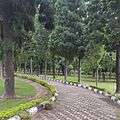 Botanical Gardens
Botanical Gardens Path to Distance Education deptt.
Path to Distance Education deptt. University is home to many peacocks
University is home to many peacocks Group of students
Group of students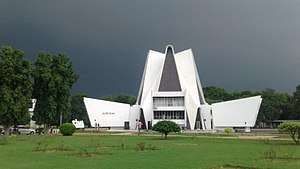 Famous Guru Gobind Singh Bhawan
Famous Guru Gobind Singh Bhawan_Trophy_2016-17_to_the_Punjabi_University%2C_Patiala%2C_in_a_glittering_ceremony%2C_at_Rashtrapati_Bhavan%2C_in_New_Delhi_on_August_29%2C_2017.jpg) MAKA trophy in 2015–16
MAKA trophy in 2015–16 Serenity in University
Serenity in University
.jpg) A sculpture in the Art Gallery
A sculpture in the Art Gallery VC presiding over a conference
VC presiding over a conference Guru Gobind Singh Bhawan
Guru Gobind Singh Bhawan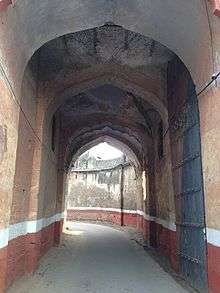 nearby Bahadurgarh Fort
nearby Bahadurgarh Fort Bombax ceiba - near Punjabi University
Bombax ceiba - near Punjabi University
References
- "List of Govt. and Private Colleges affiliated to Punjabi University, Patiala ( Academic Session 2017–18 )" (PDF). Punjabi University. Retrieved 3 December 2017.
- "Punjabi University Patiala departments". punjabiuniversity.ac.in. Retrieved 28 October 2019.
- http://www.pupdepartments.ac.in/de/
- http://dis.punjabiuniversity.ac.in/
- "Punjabi University Patiala regional centres". punjabiuniversity.ac.in. Archived from the original on 6 February 2012. Retrieved 29 January 2012.
- "Punjabi University Patiala neighborhood campuses". punjabiuniversity.ac.in. Archived from the original on 30 June 2012. Retrieved 29 January 2012.
- "Constituent Colleges". www.punjabiuniversity.ac.in. Retrieved 28 October 2018.
- http://punjabiuniversity.ac.in/Pages/OrgChart.aspx
- http://14.139.60.153/bitstream/123456789/9639/1/Punjabi_University_Act_1961.pdf
- http://www.punjabiuniversity.ac.in/Pages/Page.aspx?dsenc=PUTA
- University Calendar
- University Administration
- http://pupdepartments.ac.in/Files/hand-book-of-information-new-2019-20.pdf#%5B5%2C%7B%22name%22%3A%22XYZ%22%7D%2C87%2C770%2C0%5D
- http://www.srigranth.org/servlet/gurbani.gurbani?Action=Page&Param=356&punjabi=t&id=16349
- "University Dhuni". YouTube. Retrieved 18 April 2020.
- http://punjabiuniversity.ac.in/Pages/FacultyDepartments.aspx
- http://www.nargisduttny.org/honorees-2009/mr-maninder-singh-sethi
- http://learnpunjabi.org/
- "National Institutional Ranking Framework 2020 (Universities)". National Institutional Ranking Framework. Ministry of Education. 11 June 2020.
- "National Institutional Ranking Framework 2020 (Pharmacy)". National Institutional Ranking Framework. Ministry of Education. 11 June 2020.
- http://pupadmissions.ac.in/
- http://punjabiuniversity.ac.in/Pages/Images/Forms/courses_PatialaCampus.pdf
- https://www.tribuneindia.com/2004/20041202/punjab1.htm#18
- http://pupdepartments.ac.in/placement/placement.html
- Archived 29 September 2008 at the Wayback Machine
External links
- Punjabi University, Patiala
- Admissions portal, Punjabi University
- Official facebook page
- Computer Science & Engineering Department,Punjabi University, Patiala
- Placement Cell, Punjabi University
- UGC-Human Resource Development Centre
- Distance Education Department
- online Examination services
- Yadavindra College of Engineering, Talwandi Sabo
| Wikimedia Commons has media related to Punjabi University. |
